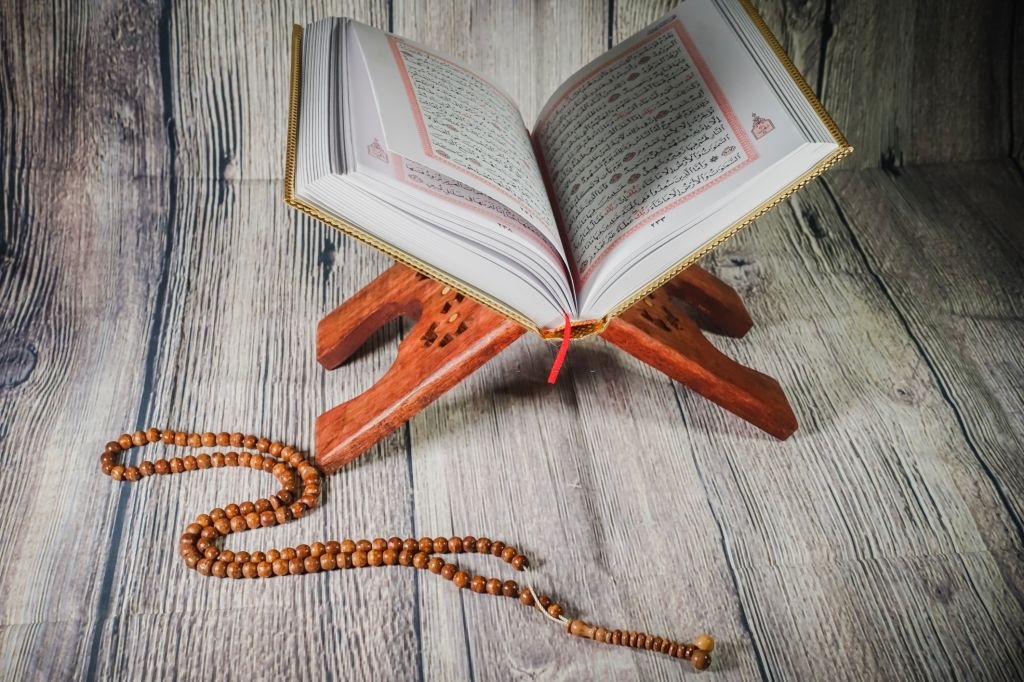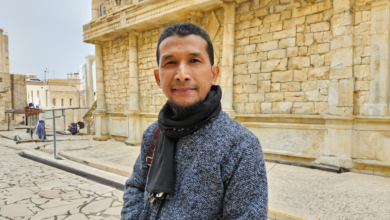History of Hadith Compilation

Position of Hadith
Hadith has an important position as a source of law in Islam. That is:
- Hadith is revelation.
Allah says:
وَمَا يَنطِقُ عَنِ الْهَوَىٰ (3) إِنْ هُوَ إِلَّا وَحْيٌ يُوحَىٰ (النجم: 4)
"And not what was uttered according to the will of hawa nafsuny (3) The utterance was nothing but revelation that was revealed (to him)." (Surah An-Najm: 4)
- Hadith is the second source of law after the Qur'an.
Allah says:
يا أيها الذين آمنوا أطيعوا الله وأطيعوا الرسول وأولي الأمر منكم فإن تنازعتم في شيء فردوه إلى الله والرسول إن كنتم تؤمنون بالله واليوم الآخر ذلك خير وأحسن تأويل (النساء: 59)
"O you who believe, obey Allah and obey His Messenger, and Ulil Amri among you, then if you have different opinions about something, then return it to Allah and Rasul, if you truly believe in Allah and the day after. . That is greater (for you) and better as a result. " (QS. An-Nisa: 59)
[darsitek number=3 tag=”article”]
Hadith functions as:
- Bayan taqriri (clarifies the contents alquran) such as the prayer of the Prophet to explain the methods of prayer that are required in the Koran;
- Bayan Tafsir (detailing the meanings of the verses of the Koran);
- Bayan Tasyri '(explains things that are not contained in al-Quran) such as zakat fithrah and others;
- Bayan Nasakh (revising laws in the Koran), such as the prohibition of giving washiyat to ahlis inheritance, revises the command to give wills to relatives in the Koran.
Definition and Scope of Hadith
Hadith is defined as:
مَا أُضِيْفَ إلَى النَّبِيِّ صلى الله عليه وسلم مِنْ قَولٍ أوْ فِعْلٍ أَوْ تَقْرِيْرٍ أو صِفَةٍ
"Everything that was relied on by the Prophet, whether in the form of words, deeds, attitudes, or characteristics."
While the scope, the hadith includes:
- Qawli (all the words of the Prophet Muhammad);
- Fi'li (all the actions of the Prophet Muhammad);
- Taqriri (All the confessions of the Messenger of Allah for the actions of friends);
- Washfi Khalqi (all the companions' stories about the Prophet's physical form);
- Washfi Khuluqi (all things related to the Prophet's behavior).
Sharing of Hadith and Hadith Knowledge
The science of hadith is divided into:
- The science of riwayah is the science that discusses the transfer (transmission) of everything that is leaning on the Prophet, in the form of words, deeds, taqrir (stipulation or recognition), physical characteristics, or behavior (morals) in a thorough or detailed manner. "
- Science Father; that is, the study of the nature of narration, its conditions, its kinds and laws, the conditions of the narrators, their conditions, the kinds of narration, and things related to it.
The following is the importance of studying Riwayah Science:
- Safeguarding and maintaining the hadith of the Prophet and avoiding errors in its transmission and transmission;
- Intermediaries and media will perfection us in obeying and following Rasulullah SAW and preserving his teachings.
In terms of quantity, the hadith is divided into:
- Mut Worry, namely the hadith narrated by a number of people in each generation, with that number it is impossible to lie;
- Ahad, namely the hadith that was narrated by only 1, 2 or 3 people, which did not reach the level of mutual concern. With details:
- Self-preserving 1 person is called ahad gharib;
- It is reported that 2 people are called ahad aziz;
- It is reported that 3 people are known as famous.
In terms of quality, the hadith is divided into:
- Saheeh (strong). Sahih hadith is the highest level of validity of hadith and is used as evidence or argument for all matters, both matters of faith, law, and others.
As for the conditions:
- To be continued;
- There is no syaz;
- There is no illat;
- The nurse is fair;
- The nurse has a strong memory.
- The hadith is strong but not valid and is still used as evidence.
The requirements for hasan hadith are the same as those of authentic hadith, it's just that the memory of the narrator is not as strong as the memory of the authentic hadith.
- Dhaif (weak). Dhaif hadith can only be used for fadhilah 'charity as long as it does not conflict with authentic traditions or hasan.
Because Dhaif:
- Due to the interruption of the rawi;
- Due to a defect in the rawi;
- There are narrators who often lie;
- There are rawi fasiq because of committing major sins or minor sins continuously;
- There are narrators of heresy;
- There are unknown narrators;
- Memorization of rawi is bad.
Process of the emergence and history of recording the hadith
Hadith appears by:
- Tadarruj (gradually) During the time of the Prophethood;
- There is a chronology of the birth of the hadith to make it more realistic which is called asbabul wurud.
How do you get the hadith:
- Attending science majlis;
- Socializing in the daily life of the Prophet.
- Asking the Prophet Muhammad;
- Get it from other friends.
Meanwhile, the recording of hadith can be categorized into several periods. That is:
First, recording the hadith in the prophetic era. At this time hadith was written in As-Sahifah As-Sadiqah or sheets of writings containing hadiths that were written at the time of the Prophet. Among them:
- Shahifah Sa'ad bin 'Ubadah al-Ansari ra. (d. 141 H);
- Shahifah Abdulllah bin Abi Aufa (d. 87 AH);
- Nuskhah Samurah bin Jundub (d. 60 H);
- Abu Rafi 'al-Qibthi Book;
- Shahifah Abu Musa al-Asy'ari (d. 50 AH);
- Shahifah Jabir bin Abdillah al-Ansari (d. 78 H);
- Ash-Shahifah Ash-Sadiqah Abdullah bin Amr bin al-Ash (d. 65 H);
- Shahifah Abu Salamah Nibaith bin Syarith al-Asyja'i al-Kufi ra .;
- Ash-Shahifah Hammam bin Munabbih.
Then, how to understand the prohibition of writing hadith at the time of the Prophet Muhammad?
Abu Said Al-Khudri reported that the Prophet said:
لا ا ا ا القرآن ليمحه
"Don't you write something from me. Whoever wrote it other than the Koran then delete it. "
[darsite number=3 tag=”consultation”]
This prohibition is not of a permanent nature, because the reasons for the prohibition at that time are described as follows:
- There is a concern about mixing hadith texts and the Koran, even though the two are different;
- Friends have strong memorization but are not very good at reading and writing.
Regarding the writing of hadith, there are several confessions and statements from the Prophet's companions.
Abu Hurairah ra. Said: "No one of the Sahaba of the Prophet has narrated more traditions than me, except what was in Abdulllah bin Umar. Indeed he wrote and I did not write. "
Another story from Abu Hurairah ra .:
كان رجل يشهد حديث النبي صلى الله عليه وسلم فلا يحفظه فيسألني فأحدثه, فشكا قلة حفظه إلى رسول الله صلى الله عليه وسلم فقال له النبي صلى الله عليه وسلم "استعن على حفظك بيمينك"
“A man witnessed the hadith of the Prophet, but he was unable to memorize it, so he asked me, I also told him. Then he complained about his weak memorization to Rasululah saw, then he answered: use your right hand to help your memorization. "
Right hand means here to write.
Meanwhile, Rafi 'narrated that he said to the Messenger of Allah:
يا رسول الله إنا نسمع منك اشياء أفنكتبها؟ قال: اكتبوا ولا حرج
"O Messenger of Allah, we hear from many things, can we write it? Rasulullah SAW replied: write it down, there is no problem. "
There are also stories of the inhabitants of Yemen. During the assembly, there was a man named Abu Shah who came from Yemen and said:
اكتبوا لي ا ل الله
"Write it for me O Messenger of Allah."
Then the Messenger of Allah said:
ا لأبي اه
"Write it for Abu Shah."
Second, the writing of hadith at the time of the companions. At this time the hadiths had not yet been collected into a single unit in the form of a collection book, but the practice of writing hadiths continued.
After the Prophet's death, some of the companions wrote hadiths and then sent them to some of the other friends or tabi'in. Like the writing of Sahabat Usaid bin Khudair which was sent to Marwan bin Al Hakam, the Friend of Jabir bin Samurah which was sent to 'Aamir bin Sa'ad bin Abi Waqqas, and Sahabat Zaid bin Arqam sent his hadith notes to Sahabat Anas bin Malik.
At this time the friends were busy in collecting the Koran. Meanwhile, the assemblies for conveying hadith are still running.
After the Prophet Muhammad died, the Companions routinely narrated the hadith. Among the friends who narrated the hadith the most:
- Abu Hurairah 5374 hadith
- Abdullah bin Umar 2630 hadith
- Anas bin Malik 2286 hadith
- Aisyah bint Abi Bakr 2210 hadith
- Abdullah bin Abbas 1660 hadith
- Ibn Abbas radhiallu anhu
- Jabir bin Abdillah 1540 hadith
- Abu Said Al Khudri 1170 hadith
After Umar bin Khattab conquered major countries such as Syria, Palestine, Persia, Egypt and others, many of his friends were assigned to go out for jihad, trade, teach, and even become governors. Through this the hadiths were conveyed to all corners of the country.
Third, codification of hadith in the second century. The first hadith bookkeeping at the request of the Caliph Abdul Aziz Marwan (d. 85 AH). He ordered the scholars of his time to look for the Prophet's hadiths, then write them down on sheets, then collect them.
The collection of hadiths is better known as the collection of hadiths carried out by Imam Muhammad bin Syihab az-Zuhri. Imam az-Zuhri said:
أَمَرَنَا عُمَرُ بْنُ عَبْدِ الْعَزِيزِ بِجَمْعِ السُّنَنِ فَكَتَبْنَاهَا دَفْتَرًا دَفْتَرًلَِ
"Caliph Umar bin Abdul Aziz ordered us to collect the traditions of the Prophet (hadith). So we wrote it down on hadith records, then we sent one set of notes to each region. "
The completion of hadith bookkeeping was continued by Umar bin Abdul Aziz.
Hadith books that appeared in the second century:
- Jami ', written by Ma'mar bin Rashid (d. 150 AH);
- Muwattha 'written by Imam Malik (d. 179 H);
- Al-Jami 'written by Ibn Wahab (d. 197 H).
Fourth, the codification of hadith in the third century. This is the golden age of hadith, because at this time the polarussittah appeared.
In this century hadith scholars have been sorting out the hadiths of the Prophet Muhammad and the words of friends and tabi'in. And most importantly, in this period the hadith quality has been classified.
Third century hadith books:
- Musnad al-Humaidi, by Abu Bakr Abdullah bin az-Zubair bin Isa bin Abid al-Qurasyi al-Humaidi (d. 219 H);
- Al-Musnad, by Abu Abdillah Ahmad bin Muhammad bin Hanbal bin Hilal bin Asad asy-Syaibani (d. 241 H);
- Sunan Ad-Darimi, by Abu Muhammad Abdullah bin Abdurrahman bin al-Fadhl bin Bahram bin Abdus Shamad ad-Darimi (d. 255 H);
- Sahih Al-Bukhari, by Muhammad bin Ismail bin Ibrahim bin al-Mughirah al-Bukhari (d. 256 H);
- Saheeh Muslim, by Muslim bin al-Hajjaj Abu al-Hasan al-Qusyairi an-Naisaburi (d. 261 H);
- Sunan Ibn Majah, by Ibn Majah Abu Abdillah Muhammad bin Yazid al-Qazwaini (d. 273 H);
- Sunan Abi Daud, by Abu Daud Sulaiman bin al-Asy'ats bin Ishaq bin Bashir bin Syadad bin Amrin As-Sijistani (d. 275 H);
- Jami 'At-Tirmidhi, by Muhammad bin Isa bin Saurah bin Musa bin Adh-Dhahak at-tirmidzi (d. 279 H);
- Sunan An-Nasa'I, by Abu Abdurrahman Ahmad bin Syu'aib bin Ali Al-Khurasani An-Nasa'I (d. 303 H).
Fifth, the writing of hadith in the modern era. In the modern period, many hadiths were written and collected on certain themes, but their validity still refers to the existing books.
Hadith Falsification Factors and Their Anticipation
- Khilafah siyasiyah (political strife) which many rafidhah practice;
- Zindiqah, namely hatred of Islam so as to spread heretical ideas;
- Ashabiyah (fanaticism);
- Al-Qashash wal wa'zhu, namely storytellers to become advisors;
- Al-Khilafat al-fiqhiyat (fiqh dispute);
- Al-Jahlu bid-din ma'ar-raghbah bil-khair, ignorant of religion but reluctant of kindness;
- Attaqarrub lil-muluk wal-umara, approached the ruler.
Efforts to anticipate hadith forgery:
- Isnad Hadith, that is, all the hadiths that are mentioned must have a source;
- Tadwin Al-Hadith, compilation of Hadith in books;
- Wadh'u ilmi al-hadith, namely the determination of the science of hadith.
...
Oleh Ustadz H. Muhammad Hanafi, Lc., M.Sy, delivered at the DDHK Online Perantau Madrasah (MPO) study, Sunday, March 28, 2021.
>>> Friends of immigrants in any country can take part in the MPO DDHK study every Saturday and Sunday, via Zoom and LIVE broadcasts on the Facebook page Dompet Dhuafa Hong Kong (https://web.facebook.com/DDHongkong)



